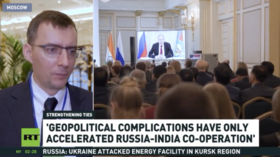Russian oil supplies to China jumped 24% in 2023 – data

Russia moved past Saudi Arabia in 2023 to become the largest exporter of oil to China, Chinese customs data released on Saturday showed.
Just over 107 million metric tons of Russian oil were shipped to China in 2023, a figure that comes out to 2.14 million barrels per day, thus marking a year-on-year increase of 24%. The record high crude shipments came despite Ukraine-related sanctions imposed on Russian oil exports by the West.
Saudi Arabia shipped some 86 million metric tons in 2023, while Iraq, the third biggest oil supplier to China, delivered 59 million tons. In December alone, Russia’s oil exports to China amounted to 9.5 million tons, which is 6.2% higher than the volume of supplies in November.
Moscow began diversifying its energy supplies in 2022 after the EU, G7, and allies imposed an embargo on seaborne Russian oil along with a $60-per-barrel price cap on other types of crude in an effort to curb Russian energy revenues. Similar restrictions were subsequently introduced for exports of petroleum products. The agreed ceiling for diesel is $100 per barrel, and $45 for discounted products such as fuel oil.
As a result, Russian oil producers have rerouted supplies of East Siberian crude to Asia, and resumed transportation of crude by rail.
Last month, Russian Deputy Prime Minister Alexander Novak said that oil sales to the EU, once Russia’s biggest market, had dropped by 90%. Meanwhile, a number of Western officials have noted that oil from Russia is still entering the EU market via intermediaries at an elevated price.
For more stories on economy & finance visit RT's business section













